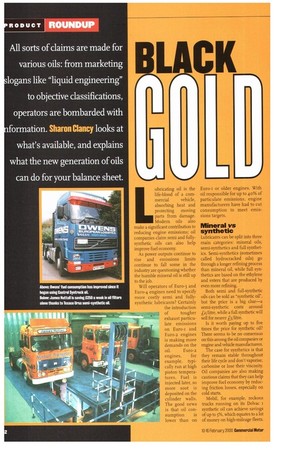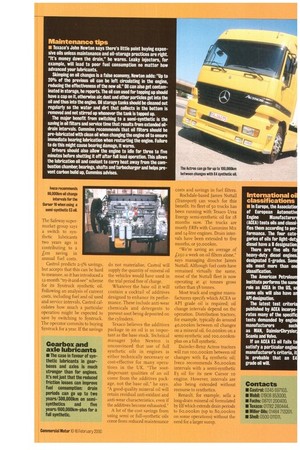All sorts of claims are made for various oils: from
Page 44

Page 45

If you've noticed an error in this article please click here to report it so we can fix it.
marketing logans like "liquid engineering" to objective classifications, operators are bombarded with formation. Sharon Clancy looks at what's available, and explains what the new generation of oils can do for your balance sheet. Lubricating oil is the life-blood of a com
mercial vehicle, absorbing heat and protecting moving parts from damage. Modern oils also make a significant contribution to reducing engine emissions; oil companies claim semi and fullysynthetic oils can also help improve fuel economy.
As power outputs continue to rise and emissions limits continue to fall some in the industry are questioning whether the humble mineral oil is still up to the job.
Will operators of Euro-3 and Euro-4 engines need to specify more costly semi and fullysynthetic lubricants? Certainly the introduction
of tougher exhaust particulate emissions on Euro-1 and Euro-2 engines is making more demands on the oil. EUTO-2
engines, for
example. typically run at high piston temperatures. Fuel is injected later, so more soot is deposited on the cylinder walls. The good news is that oil con sumption is lower than on Euro-i or older engines. With oil responsible for up to 40% of particulate emissions, engine manufacturers have had to cut consumption to meet emissions targets.
Mineral vs synthetic
Lubricants can be split into three main categories: mineral oils, semi-synthetics and full synthet ics. Semi-synthetics (sometimes called hydrocracked oils) go through a longer refining process than mineral oil, while full synthetics are based on the ethylene and esters that are produced by even more refining.
Both semi and full-synthetic oils can be sold as "synthetic oil", but the price is a big clue—a semi-synthetic costs around £2/litre, while a full synthetic will sell for nearer £3/litre.
Is it worth paying up to five times the price for synthetic oil?
There seems to be no consensus
on this among the oil companies or engine and vehide manufacturers. The case for synthetics is that they remain stable throughout
their life cyde and don't vaporise, carbonise or lose their viscosity, Oil companies are also making cautious claims that they can help
improve fuel economy by reducing friction losses, especially on cold starts.
Mobil, for example, reckons trucks running on its Delvac synthetic oil can achieve savings of up to 5%, which equates to a lot of money on high-mileage fleets.
The Safeway supermarket group says a switch to synthetic lubricants two years ago is contributing to a fun saving in annual fuel costs.
Castro] predicts 2-3% savings, but accepts that this can be hard to measure, so it has introduced a iz-month "try-it-and-see" scheme for its Syntruck synthetic oil. Following an analysis of current costs, including fuel and oil used and service intervals, Castrol calculates how much a particular operation might be expected to save by switching to Syntruck. The operator commits to buying Syntruck for a year. If the savings
do not materialise, Castro! will supply the quantity of mineral oil the vehicles would have used in the trial period free of charge.
Whatever the base oil it will contain a cocktail of additives designed to enhance its performance. These include anti-wear chemicals and detergents to prevent soot being deposited on the cylinders.
Texaco believes the additives package in an oil is as important as the base stock. Technical manager John Newton is unconvinced that use of full synthetic oils in engines is either technically necessary or cost-effective for many operations in the UK. "The sootdispersant qualities of an oil come from the additives package, not the base oil," he says. "A good-quality mineral oil will retain residual anti-oxidant and anti-wear characteristics, even if the additives become exhausted."
A lot of the cost savings from using semi or full-synthetic oils come from reduced maintenance costs and savings in fuel filters.
Rochdale-based James Nuttall (Transport) can vouch for this benefit. Its fleet of 50 trucks has been running with Texaco Ursa Energy semi-synthetic oil for 18 months now. The trucks are mostly ERFs with Cummins Mir and 4-litre engines. Drain intervals have been extended to five months, or 5o,000lcm.
"We're saving an average of f250 a week on oil filters alone," says managing director James Nuttall. Although fuel costs have remained virtually the same, most of the Nuttall fleet is now operating at 41 tonnes gross rather than 38 tonnes.
Most truck and engine manufacturers specify which ACEA or API grade oil is required; oil change intervals depend on the operation. Distribution tractors, for example, typically do around 4o,000km between oil changes on a mineral oil, 6o,000krn on a semi-synthetic and Too , 000kmplus on a full synthetic.
Daimler-Benz Actros tractors will run roo,000km between oil changes with E4 synthetic oil: Iveco recommends 8o,000km intervals with a semi-synthetic E3 oil for its new Cursor Do engine. However, intervals are also being extended without recourse to synthetics.
Renault, for example, sells a long-drain mineral oil formulated by Elf which extends drain periods to 6o,000kin (up to 8o,000km on some operations) without the need for a larger sump.
Maintenance tips
lll Texaco's John Newton says there's little point buying expensive oils unless maintenance and oil-storage practices are right. "It's money down the drain," he warns. Leaky injectors, for example, will lead to poor fuel consumption no matter how advanced your lubricants.
Skimping on oil changes is a false economy, Newton adds: "Up to 200/0 of the previous oil can be left circulating in the engine, reducing the effectiveness of the new oil." Oil can also get contaminated in storage, he reports. The oil can used for topping up should have a cap on it, otherwise air, dust and other particles get into the oil and thus into the engine. Oil storage tanks should be cleaned out regularly so the water and dirt that collects in the bottom is removed and not stirred up whenever the tank is topped up.
The major benefit from switching to a semi-synthetic is the saving in oil filters and service time that results from extended oildrain intervals. Cummins recommends that oil filters should be pre-lubricated with clean oil when changing the engine oil to ensure immediate bearing lubrication when restarting the engine. Failure to do this might cause bearing damage, it warns.
Drivers should also allow the engine to idle for three to five minutes before shutting it off after full load operation. This allows the lubrication oil and coolant to carry heat away from the combustion chamber, bearings, shafts and turbocharger and helps prevent carbon build up, Cummins advises.
Gearbox and axle lubricants
• The case in favour of synthetic lubricants in gearboxes and axles is much stronger than for engines. It's not just that the reduced friction losses can improve fuel consumption: drain periods can go up to two years/300,000km on semi synthetics and five years/600,000km-plus for a full synthetic.
International oi classifications
• In Europe, the Associatl. of European Automotiv Engine Manufacture (ACEA) tests oils and classi ties them according to pa formance. The four cate gories of oils for light-du diesel have a B designation There are five oils fo heavy-duty diesel engines designated E-grades. Som oils meet more than on : classification.
The American Petroleu Institute performs the sam: role as ACEA in the US, s some oils will also have a API designation.
The latest test criteri published by ACEA incorpo rates many of the specifi tests demanded by engin : manufacturers suc as MAN, DaimlerChrysle Scania and Volvo.
If an ACEA E3 oil fails t satisfy a particular engin : manufacturer's criteria, i is probable that an E. grade oil will.
Contacts
• Castro!: 0345 697103.
• Mobil: 01908 853000.
• Fuchs: 08701 200400.
• Texaco: 01782 280444.
• MiNer Oils: 01484 713201.
• Shell: 0500 011011.












































































































